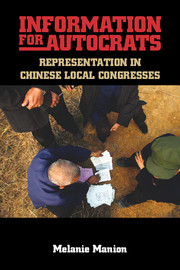Book contents
- Frontmatter
- Dedication
- Contents
- Tables and Figures
- Acknowledgments
- Introduction
- 1 Institutional Design
- 2 Selectoral Connection
- 3 Authoritarian Parochialism
- 4 Putative Principals
- 5 Independent Candidates
- Conclusion
- Appendix A Interviews and Surveys
- Appendix B Reliability Check on Delegate Self-Reports
- Appendix C Searching Independent Candidates on Sina Weibo
- Works Cited
- Index
- Miscellaneous Endmatter
Appendix C - Searching Independent Candidates on Sina Weibo
Published online by Cambridge University Press: 05 December 2015
- Frontmatter
- Dedication
- Contents
- Tables and Figures
- Acknowledgments
- Introduction
- 1 Institutional Design
- 2 Selectoral Connection
- 3 Authoritarian Parochialism
- 4 Putative Principals
- 5 Independent Candidates
- Conclusion
- Appendix A Interviews and Surveys
- Appendix B Reliability Check on Delegate Self-Reports
- Appendix C Searching Independent Candidates on Sina Weibo
- Works Cited
- Index
- Miscellaneous Endmatter
Summary
My research assistant Daisy Bui Ying Chung conducted the search for blog posts and reposts of independent candidates on Sina Weibo and coded candidate postings for the Chapter 5 discussion of candidate electoral objectives. She began her search with Li Fan's World and China Institute website (http://www.world-china.org/); the Center for the Study of the People's Congress and Foreign Legislatures website (http://www.e-cpcs.org/), affiliated with Peking University's Center for the Study of the People's Congress and Legislatures and the Research Institute on Constitutional Government of the Chinese University of Politics and Law; Fudan University's Elections and People's Congress Center website (http://www.fepc.org.cn/); and the Carter Center's China Elections and Government website (http://chinaelectionsblog.net/). She then used search engines Baidu and especially Duxiu. An effective search method was to link keywords from one article to find others. She was able to access blogs and even deleted reposts. Two blogs provided unofficial lists of independent candidates by name. An October 2011 blog listed 90 candidates; a January 2012 blog listed 103 candidates. Eliminating overlap and adding names found through searches produced a list of 152 independent candidates, whose blog posts and reposts could be searched by candidate name. Of the 152, she found sufficient information in blog posts and reposts to write up brief biographies and code electoral objectives of 61 independent candidates. This includes 22 of the 23 members of Beijing proto-parties.
- Type
- Chapter
- Information
- Information for AutocratsRepresentation in Chinese Local Congresses, pp. 170Publisher: Cambridge University PressPrint publication year: 2015



